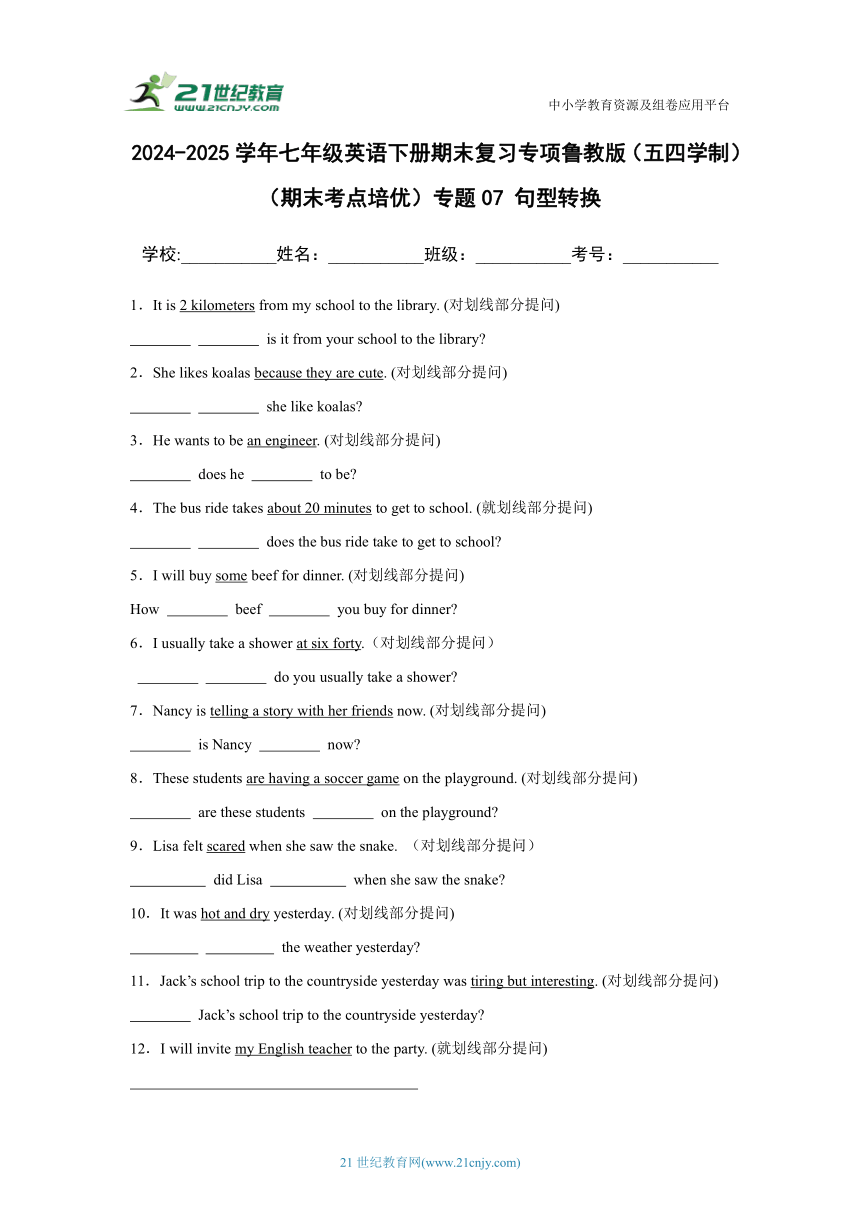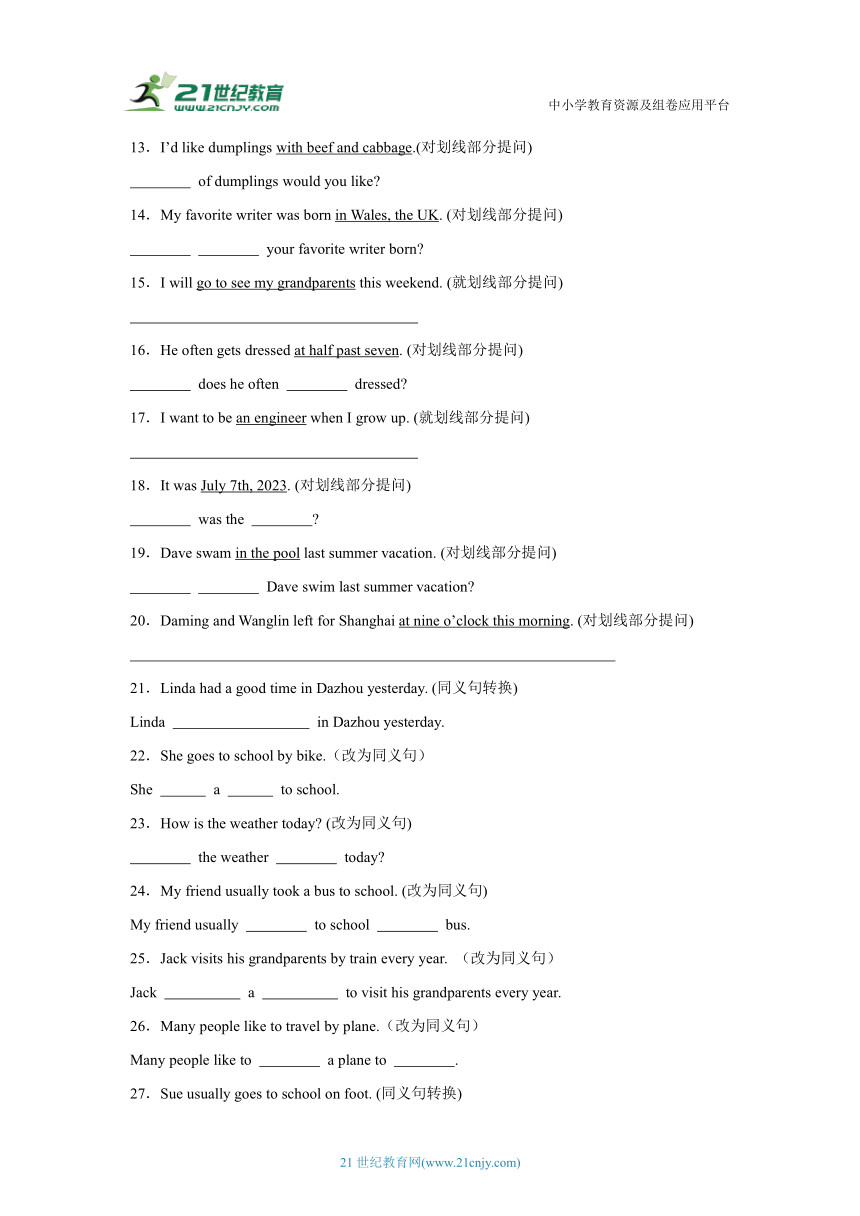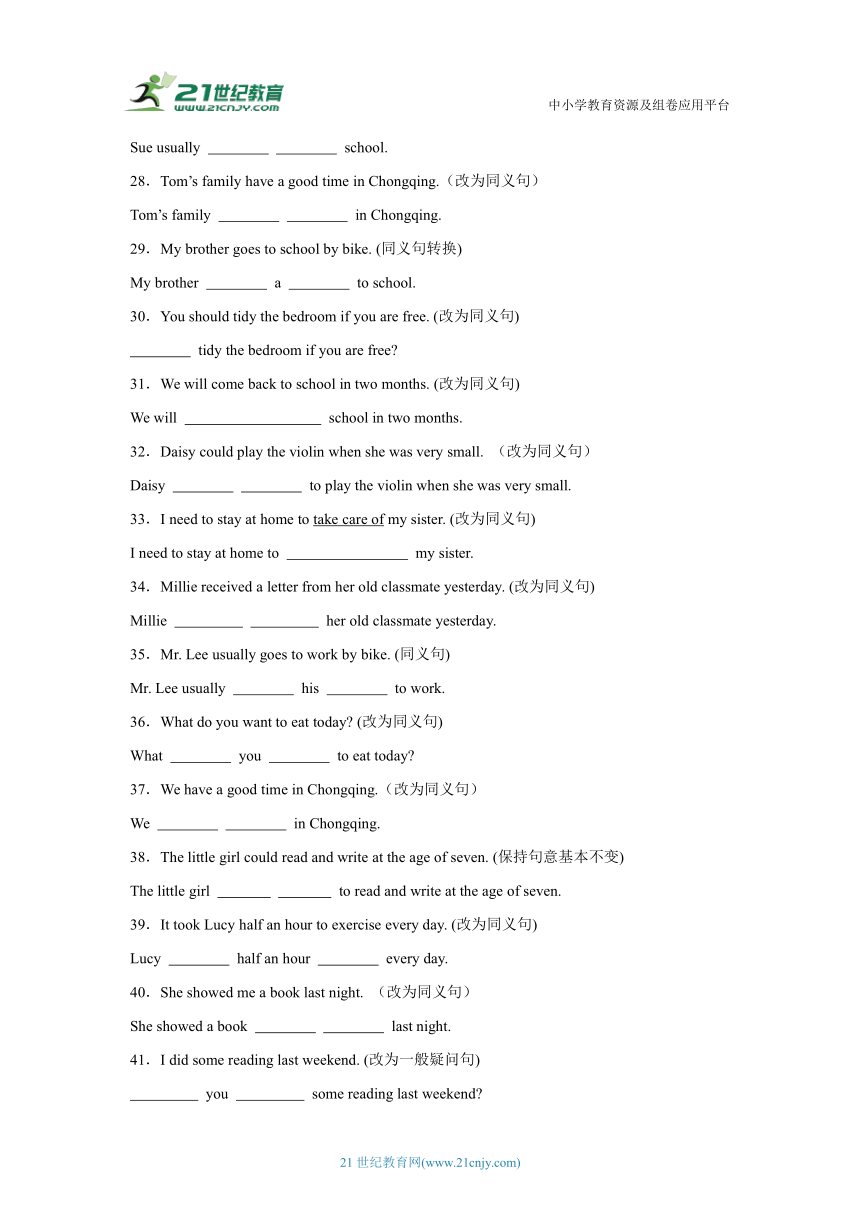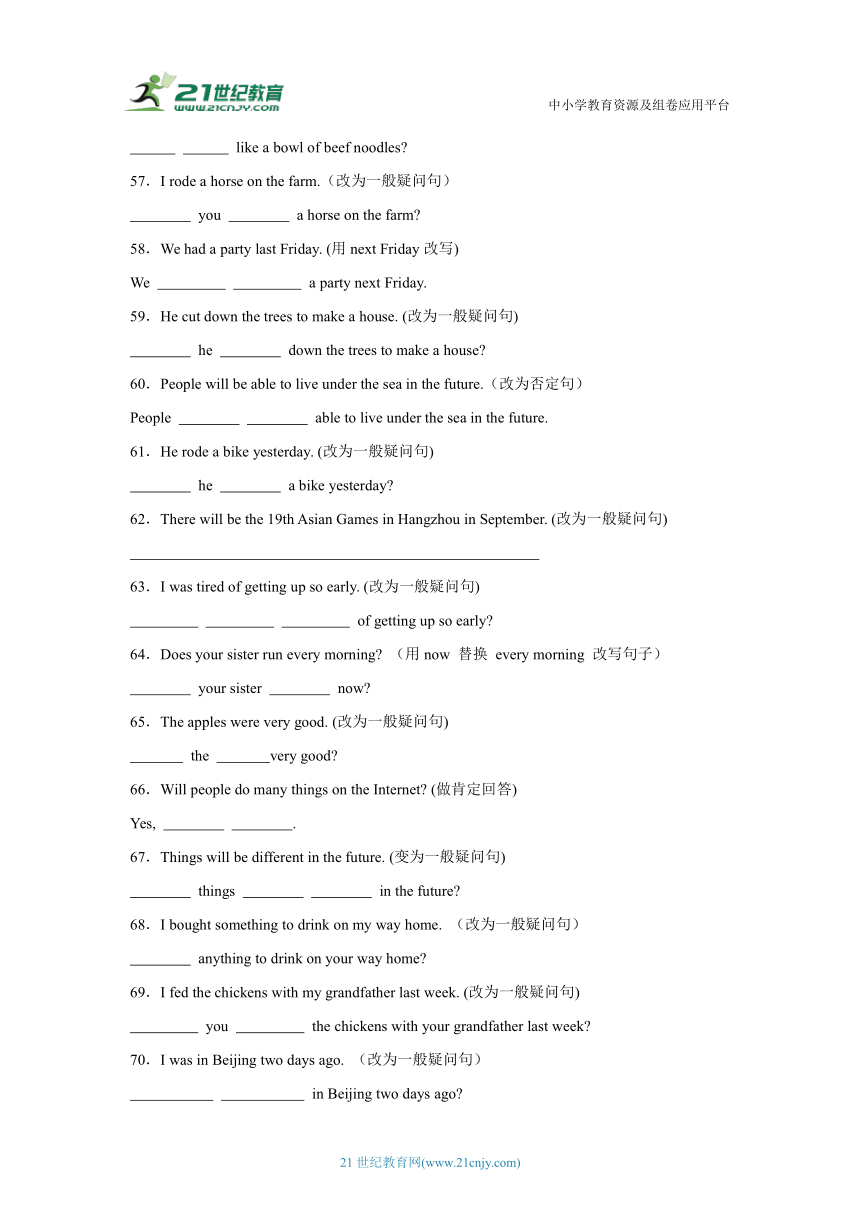(期末考点培优)专题07 句型转换-2024-2025学年七年级英语下册期末复习考点培优专项鲁教版(五四学制)(含答案解析)
文档属性
| 名称 | (期末考点培优)专题07 句型转换-2024-2025学年七年级英语下册期末复习考点培优专项鲁教版(五四学制)(含答案解析) |  | |
| 格式 | docx | ||
| 文件大小 | 58.6KB | ||
| 资源类型 | 试卷 | ||
| 版本资源 | 鲁教版 | ||
| 科目 | 英语 | ||
| 更新时间 | 2025-06-01 10:52:35 | ||
图片预览





文档简介
中小学教育资源及组卷应用平台
中小学教育资源及组卷应用平台
2024-2025学年七年级英语下册期末复习专项鲁教版(五四学制)(期末考点培优)专题07 句型转换
学校:___________姓名:___________班级:___________考号:___________
1.It is 2 kilometers from my school to the library. (对划线部分提问)
is it from your school to the library
2.She likes koalas because they are cute. (对划线部分提问)
she like koalas
3.He wants to be an engineer. (对划线部分提问)
does he to be
4.The bus ride takes about 20 minutes to get to school. (就划线部分提问)
does the bus ride take to get to school
5.I will buy some beef for dinner. (对划线部分提问)
How beef you buy for dinner
6.I usually take a shower at six forty.(对划线部分提问)
do you usually take a shower
7.Nancy is telling a story with her friends now. (对划线部分提问)
is Nancy now
8.These students are having a soccer game on the playground. (对划线部分提问)
are these students on the playground
9.Lisa felt scared when she saw the snake. (对划线部分提问)
did Lisa when she saw the snake
10.It was hot and dry yesterday. (对划线部分提问)
the weather yesterday
11.Jack’s school trip to the countryside yesterday was tiring but interesting. (对划线部分提问)
Jack’s school trip to the countryside yesterday
12.I will invite my English teacher to the party. (就划线部分提问)
13.I’d like dumplings with beef and cabbage.(对划线部分提问)
of dumplings would you like
14.My favorite writer was born in Wales, the UK. (对划线部分提问)
your favorite writer born
15.I will go to see my grandparents this weekend. (就划线部分提问)
16.He often gets dressed at half past seven. (对划线部分提问)
does he often dressed
17.I want to be an engineer when I grow up. (就划线部分提问)
18.It was July 7th, 2023. (对划线部分提问)
was the
19.Dave swam in the pool last summer vacation. (对划线部分提问)
Dave swim last summer vacation
20.Daming and Wanglin left for Shanghai at nine o’clock this morning. (对划线部分提问)
21.Linda had a good time in Dazhou yesterday. (同义句转换)
Linda in Dazhou yesterday.
22.She goes to school by bike.(改为同义句)
She a to school.
23.How is the weather today (改为同义句)
the weather today
24.My friend usually took a bus to school. (改为同义句)
My friend usually to school bus.
25.Jack visits his grandparents by train every year. (改为同义句)
Jack a to visit his grandparents every year.
26.Many people like to travel by plane.(改为同义句)
Many people like to a plane to .
27.Sue usually goes to school on foot. (同义句转换)
Sue usually school.
28.Tom’s family have a good time in Chongqing.(改为同义句)
Tom’s family in Chongqing.
29.My brother goes to school by bike. (同义句转换)
My brother a to school.
30.You should tidy the bedroom if you are free. (改为同义句)
tidy the bedroom if you are free
31.We will come back to school in two months. (改为同义句)
We will school in two months.
32.Daisy could play the violin when she was very small. (改为同义句)
Daisy to play the violin when she was very small.
33.I need to stay at home to take care of my sister. (改为同义句)
I need to stay at home to my sister.
34.Millie received a letter from her old classmate yesterday. (改为同义句)
Millie her old classmate yesterday.
35.Mr. Lee usually goes to work by bike. (同义句)
Mr. Lee usually his to work.
36.What do you want to eat today (改为同义句)
What you to eat today
37.We have a good time in Chongqing.(改为同义句)
We in Chongqing.
38.The little girl could read and write at the age of seven. (保持句意基本不变)
The little girl to read and write at the age of seven.
39.It took Lucy half an hour to exercise every day. (改为同义句)
Lucy half an hour every day.
40.She showed me a book last night. (改为同义句)
She showed a book last night.
41.I did some reading last weekend. (改为一般疑问句)
you some reading last weekend
42.There are some beautiful parks in Neijiang. (改为一般疑问句)
there beautiful parks in Neijiang
43.Gina can sing and dance. (改为否定句)
Gina sing dance.
44.I’m going to move to Shanghai. (改为一般疑问句)
you to move to Shanghai
45.I can play the drum. (改为否定句)
I the drum.
46.She has a headache. (改为一般疑问句)
she a headache
47.There will be more fresh water in the future. (变为一般疑问句)
48.Lisa fed chickens on the farm this morning. (变成一般疑问句)
Lisa chickens on the farm this morning
49.There are some robots in the hotel. (变一般疑问句)
50.Put some butter on a piece of bread. (变为否定句)
51.I’d like some tomato and egg noodles. (改为一般疑问句)
you some tomato and egg noodles
52.I’m reading a newspaper in the living room. (改为一般疑问句)
you a newspaper in the living room
53.I went to a farm last weekend. (改为一般疑问句)
you to a farm last weekend
54.I did my homework last weekend. (改为一般疑问句)
you your homework last weekend
55.Jack has saved some money to buy a present for his mum. (改一般疑问句)
Jack saved money to buy a present for his mum
56.I’d like a bowl of beef noodles. (改为一般疑问句)
like a bowl of beef noodles
57.I rode a horse on the farm.(改为一般疑问句)
you a horse on the farm
58.We had a party last Friday. (用next Friday改写)
We a party next Friday.
59.He cut down the trees to make a house. (改为一般疑问句)
he down the trees to make a house
60.People will be able to live under the sea in the future.(改为否定句)
People able to live under the sea in the future.
61.He rode a bike yesterday. (改为一般疑问句)
he a bike yesterday
62.There will be the 19th Asian Games in Hangzhou in September. (改为一般疑问句)
63.I was tired of getting up so early. (改为一般疑问句)
of getting up so early
64.Does your sister run every morning (用now 替换 every morning 改写句子)
your sister now
65.The apples were very good. (改为一般疑问句)
the very good
66.Will people do many things on the Internet (做肯定回答)
Yes, .
67.Things will be different in the future. (变为一般疑问句)
things in the future
68.I bought something to drink on my way home. (改为一般疑问句)
anything to drink on your way home
69.I fed the chickens with my grandfather last week. (改为一般疑问句)
you the chickens with your grandfather last week
70.I was in Beijing two days ago. (改为一般疑问句)
in Beijing two days ago
71.He can play chess. (改为一般疑问句)
play chess
72.Henry bought some presents in the gift shop yesterday. (改为一般疑问句)
Henry any presents in the gift shop yesterday
73.The farmers grew strawberries last December. (改为一般疑问句)
the farmers strawberries last December
74.Jack left the office. Jack didn’t reply to Lisa’s email. (合并为一句)
Jack left the office to Lisa’s email.
75.The girl left. She didn’t take anything away. (合并为一句)
The girl left anything away.
76.I am having dinner with my family now. (改为一般疑问句)
you dinner with your family now
77.My father took many interesting photos yesterday. (改为一般疑问句)
your father many interesting photos yesterday
78.Mike often reads books in the library. (改为一般疑问句)
Mike often books in the library
79.They went camping in a small village. (变为一般疑问句)
they camping in a small village
80.We are busy on weekdays. (改为一般疑问句)
you on weekdays
中小学教育资源及组卷应用平台
中小学教育资源及组卷应用平台
21世纪教育网(www.21cnjy.com)
21世纪教育网(www.21cnjy.com)
参考答案及试题解析
1.How far
【解析】句意:从我的学校到图书馆有2公里。此处对距离进行提问,应用how far引导特殊疑问句,句首首字母大写。故填How;far。
2.Why does
【解析】句意:她喜欢考拉,因为它们很可爱。对划线部分“because they are cute”提问,应用“why”来询问原因,时态为一般现在时,主语是she,疑问句中需用助动词does放于主语前。故填Why;does。
3.What want
【解析】句意:他想成为一名工程师。划线部分“an engineer”是一种职业,对其提问要用what;助动词提至主语之前,谓语动词用原形,wants的原形为want。故填What;want。
4.How long
【解析】句意:乘公共汽车到学校大约需要20分钟。根据划线部分“about 20 minutes”可知是对时间的长度提问,要用how long“时间多长”,放在句首时要大写第一个字母。故填How;long。
5.much will
【解析】句意:我要买些牛肉当晚餐。划线部分some表示“一些”,且“beef牛肉”为不可数名词,对不可数名词数量提问应用疑问词“How much”引导特殊疑问句,后接一般疑问句语序。把will提到主语前,故填much;will。
6.What time
【解析】句意:我通常在六点四十分洗澡。划线部分“at six forty”是具体时刻,用特殊疑问词what time提问,表示“几点”。故填What;time。
7.What doing
【解析】句意:南希正在和她的朋友们讲故事。划线部分表示正在做的事,用what提问,do“做”,时态是现在进行时,故填What;doing。
8.What doing
【解析】句意:这些学生正在操场上踢足球。原句为现在进行时,划线部分“are having a soccer game”属于动作,提问常用疑问词what;用do指代动作,此处需用现在分词doing。故填What;doing。
9.How feel
【解析】句意:丽莎感到害怕当她看见蛇的时候。原句划线部分scared“害怕的”属于精神状况,提问常用疑问词How。再把剩余部分变为一般疑问句,原句为一般过去时,需借助助动词did,原felt恢复原形。故填:How;feel。
10.How was
【解析】句意:昨天天气又热又干。对天气提问有两种方式:What’s the weather like 或者How is the weather 结合设空及句子是一般过去时可知,应用How was。故填How;was。
11.How was
【解析】句意:杰克昨天的学校乡村旅行很累,但很有趣。根据划线部分可知,此句用how提问,意为“怎样”,原句中含有系动词“was”,提到主语前构成疑问句。故填How was。
12.Who will you invite to the party
【解析】句意:我会邀请我的英语老师去参加派对。划线部分my English teacher,指人,应用who来提问,主语I改为you。故填Who will you invite to the party
13.What kind
【解析】句意:我要牛肉和卷心菜饺子。划线部分是饺子的种类,应用what kind of提问。故填What kind。
14.Where was
【解析】句意:我最喜欢的作家出生在英国的威尔士。划线部分“in Wales, the UK”是对地点提问,用特殊疑问词where,后跟一般疑问句,即把be动词“was”提前,放在疑问词之后。故填Where;was。
15.What will you do this weekend
【解析】句意:这个周末我要去看我的祖父母。划线部分是动作,应用what提问;原句是一般将来时:will do,变为疑问句,需要把will放到疑问词后,主语之前;疑问句中需要把第一人称I变为第二人称you。划线部分动作用动词原形do替换。故填What will you do this weekend
16.When get
【解析】句意:他经常在七点半穿好衣服。此处是对时间进行提问,因此用when提问,句中有助动词does,动词get填原形。故填When;get。
17.What do you want to be when you grow up
【解析】句意:当我长大了我想当一名工程师。划线部分“an engineer”是描述职业,提问职业,用特殊疑问词what,询问对方想成为什么应使用句型What do you want to be?后半句时间状语从句不用变,故填What do you want to be when you grow up
18.What date
【解析】句意:那是2023年7月7日。划线部分表示日期,用疑问词what“什么”,date“日期”,故填What;date。
19.Where did
【解析】句意:戴夫去年暑假在游泳池里游泳。划线部分表示地点,用where提问,时态是一般过去时,把助动词did放到主语前,故填Where;did。
20.When did Daming and Wanglin leave for Shanghai
【解析】句意:大明和王林今天早上九点动身去上海了。划线部分是时间状语,对此提问应是表达“大明和王林什么时候动身去的上海”,提问用疑问词when;时态为一般过去时,疑问句借助于助动词did,后跟动词原形leave。故填When did Daming and Wanglin leave for Shanghai
21.had fun/enjoyed herself
【解析】句意:琳达昨天在达州玩得很开心。have a good time “玩得愉快”=have fun=enjoy oneself,主语Linda是女性,反身代词用herself,根据had可知,改写后的句子也用一般过去时,动词用过去式,故填had fun/enjoyed herself。
22.rides bike
【解析】句意:她骑自行车去上学。go to school by bike=ride a bike to school,表示“骑自行车上学”。句子是一般现在时,主语是第三人称单数,动词用三单形式。故填rides;bike。
23.What’s like
【解析】句意:今天天气怎么样?How is the weather today=What is the weather like today,表示“今天天气怎么样”。故填What’s;like。
24.went by
【解析】句意:我的朋友通常乘公共汽车上学。take a bus to school=go to school by bus,表示“乘公共汽车上学”。原句是一般过去时,动词go用过去式went。故填went;by。
25.takes train
【解析】句意:杰克每年都乘火车去看望他的祖父母。by train/take a train“乘火车”,主语Jack,时态一般现在时,因此谓语用三单形式takes。故填takes;train。
26.take travel
【解析】句意:许多人喜欢乘飞机旅行。by plane=take a plane乘飞机。like to do“喜欢做什么”,take用原形;travel前有动词不定式符号,动词用原形。故填take;travel。
27.walks to
【解析】句意:苏通常步行去上学。go to school on foot=walk to school“步行去学校”,主语是Sue,时态是一般现在时,所以空处用动词的三单形式。故填walks;to。
28.have/enjoy fun/themselves
【解析】句意:汤姆一家在重庆玩得很开心。have a good time=have fun=enjoy oneself“玩得开心”,是同义词短语,根据原句可知,此句用一般现在时,have和enjoy均用原形;根据主语“Tom’s family”可知,此处反身代词用themselves,意为“他们自己”。故填have/enjoy;fun/themselves。
29.rides bike
【解析】句意:我哥哥骑自行车去上学。根据题意可知,骑自行车还可以用ride a bike表示,主语是My brother,句子时态是一般现在时,谓语动词用单数第三人称rides。故填rides;bike。
30.Why not
【解析】句意:如果你有空,你应该整理卧室。此处可改为“如果你有空,为什么不整理一下卧室”,Why not do sth.“为什么不做某事”。故填Why not。
31.return to
【解析】句意:我们将在两个月后回到学校。“返回,回到”的表达有两种方式:come back或者return to,二者可以互换。空前有will,后接动词原形。故填return to。
32.was able
【解析】句意:黛西很小的时候就会拉小提琴。表示“能够”可用be able to,根据“could”可知句子用一般过去时,主语是Daisy,be动词用was。故填was;able。
33.look after
【解析】句意:我需要待在家里照顾妹妹。动词短语take care of表示“照顾”,与look after同义,不定式to后接动词原形。故填look;after。
34.heard from
【解析】句意:米莉昨天收到了她的老同学的一封信。根据题意可知,此处可以表达为“收到……的来信”,收到……的来信:hear from,事情发生在过去,因此此处用动词过去式heard。故填heard;from。
35.rides bike
【解析】句意:李先生通常骑自行车去上班。by bike是介词短语,此处缺谓语动词,可以用ride one’s bike表示“骑自行车”。句子是一般现在时,主语是第三人称单数,动词用三单形式。故填rides;bike。
36.would like
【解析】句意:你今天想吃什么?表示“想要做某事”可用结构would like to do sth.,变疑问句时把would放主语之前。故填would;like。
37.enjoy ourselves
【解析】句意:我们在重庆玩得很开心。have a good time=enjoy oneself“玩得开心”,此处用反身代词ourselves“我们自己”,句子用一般现在时,主语是we,谓语动词用原形。故填enjoy;ourselves。
38.was able
【解析】句意:这个小女孩七岁的时候会读会写。保持句意基本不变,可以用be able to do“能够做”;时态为一般过去时,主语是单数girl,be动词用was。故填was;able。
39.spent exercising
【解析】句意:Lucy每天花半个小时锻炼身体。it took sb some time to do sth表示“做某事花费某人多长时间”,它的同义结构为sb spent time doing sth。原句是一般过去时,此处动词也用过去式,故填spent;exercising。
40.to me
【解析】句意:她昨晚给我展示了一本书。show sb. sth.=show sth. to sb. “给某人展示某物”,二者可以互换。故填to;me。
41.Did do
【解析】句意:上周末我读了一些书。谓语动词为动词的过去式,改为一般疑问句使用助动词did,后跟动词原形do,句首首字母应大写。故填Did;do。
42.Are any
【解析】句意:内江有一些美丽的公园。改为一般疑问句,需将be动词are放于句首,some一般不用于疑问句,应改为any。故填Are;any。
43.can’t or
【解析】句意:吉娜会唱歌跳舞。含有情态动词can的句子,变否定句在情态动词can后面直接加not,缩写为can’t;and否定句中要改为or。故填can’t;or。
44.Are going
【解析】句意:我打算搬到上海去。原句“I’m going to...”是一般将来时,改为一般疑问句时,需要把一般将来时结构“be going to”中的be动词提前到句首,疑问句中的主语改为you,因此be动词使用are,going形式不变。故填Are;going。
45.can’t play
【解析】句意:我会打鼓。含有情态动词“can”的肯定句,否定句直接在其后加上not,可缩写为can’t,其后跟动词原形。故填can’t;play。
46.Does have
【解析】句意:她头痛。时态为一般现在时,主语为she,改为一般疑问句需要借助助动词does,位于句首,首字母要大写,后跟动词原形。故填Does;have。
47.Will there be more fresh water in the future
【解析】句意:未来会有更多的淡水。原句为there be句型的一般将来时,且是will do结构, 因此变为一般疑问句时,应把will提前放句首,并大写首字母,句末用问号。故填Will there be more fresh water in the future
48.Did feed
【解析】句意:丽莎今天早上在农场喂鸡。原句时态是一般过去时,变一般疑问句,助动词用did,放在主语前;后跟动词原形,所以fed要变成feed。句首单词首字母要大写。故填Did;feed。
49.Are there any robots in the hotel
【解析】句意:旅馆里有一些机器人。变一般疑问句,将be动词are提至句首,其余部分照抄;疑问句中some要变成any。故填Are there any robots in the hotel
50.Don’t put any butter on a piece of bread.
【解析】句意:在一片面包上涂些黄油。原句为祈使句的肯定,祈使句的否定句型为Don’t+动词原形,肯定句中用some,否定句中用any。故填Don’t put any butter on a piece of bread.
51.Would like
【解析】句意:我想要一些西红柿鸡蛋面。根据题意可知,此处要求改为一般疑问句,应该用Would sb. like进行询问,意为“你想要”,首字母大写。故填Would;like。
52.Are reading
【解析】句意:我正在客厅里看报纸。原句的主语是第一人称I,变为一般疑问句时,主语变为you,be动词变为are,放在句首主语之前;后跟现在分词reading;句首单词首字母大写。故填Are;reading。
53.Did go
【解析】句意:我上周末去农场了。由“went...last weekend”可知,句子为一般过去时,went为实意动词,变一般疑问句时在句首用助动词did,实意动词went变原形go。故填答案是Did;go。
54.Did do
【解析】句意:上周末我做了家庭作业。根据“did”可知变一般疑问句时,借助助动词did,后加动词原形do。故填Did;do。
55.Has any
【解析】句意:杰克存了一些钱给他妈妈买了一件礼物。句子为现在完成时,改为一般疑问句,助动词has放于句首,some是用在肯定句中,改为疑问句用any。故填Has;any。
56.Would you
【解析】句意:我想要一碗牛肉面。根据题意可知,此处可以表达为“你想要一碗牛肉面吗?”,用Would进行提问,主语是you“你”。故填Would;you。
57.Did ride
【解析】句意:我在农场上骑马。本题考查一般疑问句。题干为陈述句,变为一般疑问句要把be动词或情态动词提前,若没有be动词或情态动词则在句首加助动词。根据题干可知,本句没有be动词或情态动词,所以在句首加助动词,根据rode可知,本句是过去时态,所以助动词也要用过去时态,即did。又因助动词后面的动词要用原形,所以rode要变为原形ride,故填Did;ride。
58.will have
【解析】句意:上周五我们举办了一场派对。要求用next Friday改写,故时态为一般将来时,其结构是will+动词原形。故填will;have。
59.Did cut
【解析】句意:他砍倒树木来建造房屋。根据原句动词“cut”可知,此句为一般过去时,改为一般疑问句,用助动词did放在句首进行提问;句首有助动词,其后动词用原形。故填Did;cut。
60.won’t be
【解析】句意:将来人们将能够生活在海底。句子是一般将来时,改为否定句时,在will后加not,缩写为won’t,其他不变。故填won’t;be。
61.Did ride
【解析】句意:他昨天骑自行车了。原句是一般过去时,其一般疑问句需在句前加助动词did,动词过去式rode还原成原形ride。故填Did;ride。
62.Will there be the 19th Asian Games in Hangzhou in September
【解析】句意:第19届亚运会将于9月在杭州举行。根据“There will be”可知本题为There be句型的一般将来时,其一般疑问句要把will置于句首,本句其余部分不变。故填:Will there be the 19th Asian Games in Hangzhou in September
63.Were you tired
【解析】句意:我厌倦了这么早起床。原句是带有be动词的一般过去时,改为一般疑问句时要把be动词提前,主语I变成第二人称you,be动词应用were,放在句首,其他成分不变,故填Were;you;tired。
64.Is running
【解析】句意:你姐姐每天早上都跑步吗?根据时间状语“now”可知,改写后的句子时态应用现在进行时,结构为be+doing。主语your sister为第三人称单数形式,所以be动词用is,run的现在分词形式为running。此处为一般疑问句,be动词提前。故填Is;running。
65.Were apples
【解析】句意:苹果很好。原句是含be动词were的肯定句,含be动词的句子改为一般疑问句时,要将be动词提前置于句首,即主谓调换位置。故填Were;apples。
66.they will
【解析】句意:——人们会在互联网上做很多事情吗 ——是的,他们会。本句为will引导的一般疑问句,主语people为集合名词,是复数,回答时用they代替;肯定回答用Yes, 主语+will。故they;will。
67.Will be different
【解析】句意:未来的情况会有所不同。肯定句为一般将来时,结构为will be, 因此变为一般疑问句时,应把will提前放句首,并大写首字母,形容词different前应为动词原形be。故填Will;be;different。
68.Did you buy
【解析】句意:我在回家的路上买了点喝的。根据“bought”可知句子是一般过去时,变疑问句时借助助动词did,放主语I之前,后加动词原形。故填Did you buy。
69.Did feed
【解析】句意:上周我和爷爷一起喂鸡。 根据“last week”可知,此句时态为一般过去时态;fed是feed的过去式,是实义动词,因此将原句改为一般疑问句时,需要在句首加助动词Did,后面跟fed的动词原形feed。故填Did;feed。
70.Were you
【解析】句意:两天前我在北京。句子是一般过去时,要求改为一般疑问句,故将原句的第一人称I改为第二人称you,was改为were,疑问句将be动词were提前,并大写首字母。故填Were;you。
71.Can he
【解析】句意:他会下象棋。原句中有情态动词can,改为一般疑问句时,把can提到句首,后接主语he。故填Can he。
72.Did buy
【解析】句意:亨利昨天在礼品店买了一些礼物。原句中的动词“bought”是动词过去式,改成一般疑问句时,用助动词did+动词原形。故填Did;buy。
73.Did grow
【解析】句意:农民们去年12月种草莓。肯定句改一般疑问句,句子时态为一般过去时态,谓语动词是grew,因此在句首需用助动词Did,其后跟动词原形。grew的原形为grow。 故填Did;grow。
74.without replying
【解析】句意:杰克离开了办公室。杰克没有回复丽莎的电子邮件。合并为一句,可以用without“没有”,介词后接动名词replying“回复”,故填without;replying。
75.without taking
【解析】句意:这个女孩走了。她没有拿走任何东西。分析句子结构,此处应用介词without表示伴随,后接动名词taking“拿”作宾语,without taking“没有拿”。故填without;taking。
76.Are having
【解析】句意:我现在正在和我的家人一起吃晚饭。主语为you,be动词应用are,改为一般疑问句,应将be动词are提至句首,且首字母大写;having保持不变,故填Are;having。
77.Did take
【解析】句意:我爸爸昨天拍了许多有趣的照片。原句时态为一般过去时,谓语动词为took,是实义动词;变一般疑问句时要借助助动词did,置于句首,首字母要大写;过去式took还原成原形take。故填Did;take。
78.Does read
【解析】句意:麦克经常在图书馆读书。考查肯定句变一般疑问句。原句中的reads是动词第三人称单数形式,改为一般疑问句时用Does+主语+动词原形+其他。故填Does;read。
79.Did go
【解析】句意:他们在一个小村庄里露营。分析题干可知,原句为一般过去时,且谓语动词是实义动词went,变为一般疑问句时要借助助动词did,位于句首,首字母要大写,后接动词原形go。故填Did;go。
80.Are busy
【解析】句意:我们在工作日很忙。观察句子结构可知,本句是含有be动词的“主系表”结构的句子。变疑问句时,将be动词are提至句首,首字母大写,人称代词“we”换为“you”,其他照抄即可。故填Are;busy。
21世纪教育网(www.21cnjy.com)
21世纪教育网(www.21cnjy.com)
中小学教育资源及组卷应用平台
2024-2025学年七年级英语下册期末复习专项鲁教版(五四学制)(期末考点培优)专题07 句型转换
学校:___________姓名:___________班级:___________考号:___________
1.It is 2 kilometers from my school to the library. (对划线部分提问)
is it from your school to the library
2.She likes koalas because they are cute. (对划线部分提问)
she like koalas
3.He wants to be an engineer. (对划线部分提问)
does he to be
4.The bus ride takes about 20 minutes to get to school. (就划线部分提问)
does the bus ride take to get to school
5.I will buy some beef for dinner. (对划线部分提问)
How beef you buy for dinner
6.I usually take a shower at six forty.(对划线部分提问)
do you usually take a shower
7.Nancy is telling a story with her friends now. (对划线部分提问)
is Nancy now
8.These students are having a soccer game on the playground. (对划线部分提问)
are these students on the playground
9.Lisa felt scared when she saw the snake. (对划线部分提问)
did Lisa when she saw the snake
10.It was hot and dry yesterday. (对划线部分提问)
the weather yesterday
11.Jack’s school trip to the countryside yesterday was tiring but interesting. (对划线部分提问)
Jack’s school trip to the countryside yesterday
12.I will invite my English teacher to the party. (就划线部分提问)
13.I’d like dumplings with beef and cabbage.(对划线部分提问)
of dumplings would you like
14.My favorite writer was born in Wales, the UK. (对划线部分提问)
your favorite writer born
15.I will go to see my grandparents this weekend. (就划线部分提问)
16.He often gets dressed at half past seven. (对划线部分提问)
does he often dressed
17.I want to be an engineer when I grow up. (就划线部分提问)
18.It was July 7th, 2023. (对划线部分提问)
was the
19.Dave swam in the pool last summer vacation. (对划线部分提问)
Dave swim last summer vacation
20.Daming and Wanglin left for Shanghai at nine o’clock this morning. (对划线部分提问)
21.Linda had a good time in Dazhou yesterday. (同义句转换)
Linda in Dazhou yesterday.
22.She goes to school by bike.(改为同义句)
She a to school.
23.How is the weather today (改为同义句)
the weather today
24.My friend usually took a bus to school. (改为同义句)
My friend usually to school bus.
25.Jack visits his grandparents by train every year. (改为同义句)
Jack a to visit his grandparents every year.
26.Many people like to travel by plane.(改为同义句)
Many people like to a plane to .
27.Sue usually goes to school on foot. (同义句转换)
Sue usually school.
28.Tom’s family have a good time in Chongqing.(改为同义句)
Tom’s family in Chongqing.
29.My brother goes to school by bike. (同义句转换)
My brother a to school.
30.You should tidy the bedroom if you are free. (改为同义句)
tidy the bedroom if you are free
31.We will come back to school in two months. (改为同义句)
We will school in two months.
32.Daisy could play the violin when she was very small. (改为同义句)
Daisy to play the violin when she was very small.
33.I need to stay at home to take care of my sister. (改为同义句)
I need to stay at home to my sister.
34.Millie received a letter from her old classmate yesterday. (改为同义句)
Millie her old classmate yesterday.
35.Mr. Lee usually goes to work by bike. (同义句)
Mr. Lee usually his to work.
36.What do you want to eat today (改为同义句)
What you to eat today
37.We have a good time in Chongqing.(改为同义句)
We in Chongqing.
38.The little girl could read and write at the age of seven. (保持句意基本不变)
The little girl to read and write at the age of seven.
39.It took Lucy half an hour to exercise every day. (改为同义句)
Lucy half an hour every day.
40.She showed me a book last night. (改为同义句)
She showed a book last night.
41.I did some reading last weekend. (改为一般疑问句)
you some reading last weekend
42.There are some beautiful parks in Neijiang. (改为一般疑问句)
there beautiful parks in Neijiang
43.Gina can sing and dance. (改为否定句)
Gina sing dance.
44.I’m going to move to Shanghai. (改为一般疑问句)
you to move to Shanghai
45.I can play the drum. (改为否定句)
I the drum.
46.She has a headache. (改为一般疑问句)
she a headache
47.There will be more fresh water in the future. (变为一般疑问句)
48.Lisa fed chickens on the farm this morning. (变成一般疑问句)
Lisa chickens on the farm this morning
49.There are some robots in the hotel. (变一般疑问句)
50.Put some butter on a piece of bread. (变为否定句)
51.I’d like some tomato and egg noodles. (改为一般疑问句)
you some tomato and egg noodles
52.I’m reading a newspaper in the living room. (改为一般疑问句)
you a newspaper in the living room
53.I went to a farm last weekend. (改为一般疑问句)
you to a farm last weekend
54.I did my homework last weekend. (改为一般疑问句)
you your homework last weekend
55.Jack has saved some money to buy a present for his mum. (改一般疑问句)
Jack saved money to buy a present for his mum
56.I’d like a bowl of beef noodles. (改为一般疑问句)
like a bowl of beef noodles
57.I rode a horse on the farm.(改为一般疑问句)
you a horse on the farm
58.We had a party last Friday. (用next Friday改写)
We a party next Friday.
59.He cut down the trees to make a house. (改为一般疑问句)
he down the trees to make a house
60.People will be able to live under the sea in the future.(改为否定句)
People able to live under the sea in the future.
61.He rode a bike yesterday. (改为一般疑问句)
he a bike yesterday
62.There will be the 19th Asian Games in Hangzhou in September. (改为一般疑问句)
63.I was tired of getting up so early. (改为一般疑问句)
of getting up so early
64.Does your sister run every morning (用now 替换 every morning 改写句子)
your sister now
65.The apples were very good. (改为一般疑问句)
the very good
66.Will people do many things on the Internet (做肯定回答)
Yes, .
67.Things will be different in the future. (变为一般疑问句)
things in the future
68.I bought something to drink on my way home. (改为一般疑问句)
anything to drink on your way home
69.I fed the chickens with my grandfather last week. (改为一般疑问句)
you the chickens with your grandfather last week
70.I was in Beijing two days ago. (改为一般疑问句)
in Beijing two days ago
71.He can play chess. (改为一般疑问句)
play chess
72.Henry bought some presents in the gift shop yesterday. (改为一般疑问句)
Henry any presents in the gift shop yesterday
73.The farmers grew strawberries last December. (改为一般疑问句)
the farmers strawberries last December
74.Jack left the office. Jack didn’t reply to Lisa’s email. (合并为一句)
Jack left the office to Lisa’s email.
75.The girl left. She didn’t take anything away. (合并为一句)
The girl left anything away.
76.I am having dinner with my family now. (改为一般疑问句)
you dinner with your family now
77.My father took many interesting photos yesterday. (改为一般疑问句)
your father many interesting photos yesterday
78.Mike often reads books in the library. (改为一般疑问句)
Mike often books in the library
79.They went camping in a small village. (变为一般疑问句)
they camping in a small village
80.We are busy on weekdays. (改为一般疑问句)
you on weekdays
中小学教育资源及组卷应用平台
中小学教育资源及组卷应用平台
21世纪教育网(www.21cnjy.com)
21世纪教育网(www.21cnjy.com)
参考答案及试题解析
1.How far
【解析】句意:从我的学校到图书馆有2公里。此处对距离进行提问,应用how far引导特殊疑问句,句首首字母大写。故填How;far。
2.Why does
【解析】句意:她喜欢考拉,因为它们很可爱。对划线部分“because they are cute”提问,应用“why”来询问原因,时态为一般现在时,主语是she,疑问句中需用助动词does放于主语前。故填Why;does。
3.What want
【解析】句意:他想成为一名工程师。划线部分“an engineer”是一种职业,对其提问要用what;助动词提至主语之前,谓语动词用原形,wants的原形为want。故填What;want。
4.How long
【解析】句意:乘公共汽车到学校大约需要20分钟。根据划线部分“about 20 minutes”可知是对时间的长度提问,要用how long“时间多长”,放在句首时要大写第一个字母。故填How;long。
5.much will
【解析】句意:我要买些牛肉当晚餐。划线部分some表示“一些”,且“beef牛肉”为不可数名词,对不可数名词数量提问应用疑问词“How much”引导特殊疑问句,后接一般疑问句语序。把will提到主语前,故填much;will。
6.What time
【解析】句意:我通常在六点四十分洗澡。划线部分“at six forty”是具体时刻,用特殊疑问词what time提问,表示“几点”。故填What;time。
7.What doing
【解析】句意:南希正在和她的朋友们讲故事。划线部分表示正在做的事,用what提问,do“做”,时态是现在进行时,故填What;doing。
8.What doing
【解析】句意:这些学生正在操场上踢足球。原句为现在进行时,划线部分“are having a soccer game”属于动作,提问常用疑问词what;用do指代动作,此处需用现在分词doing。故填What;doing。
9.How feel
【解析】句意:丽莎感到害怕当她看见蛇的时候。原句划线部分scared“害怕的”属于精神状况,提问常用疑问词How。再把剩余部分变为一般疑问句,原句为一般过去时,需借助助动词did,原felt恢复原形。故填:How;feel。
10.How was
【解析】句意:昨天天气又热又干。对天气提问有两种方式:What’s the weather like 或者How is the weather 结合设空及句子是一般过去时可知,应用How was。故填How;was。
11.How was
【解析】句意:杰克昨天的学校乡村旅行很累,但很有趣。根据划线部分可知,此句用how提问,意为“怎样”,原句中含有系动词“was”,提到主语前构成疑问句。故填How was。
12.Who will you invite to the party
【解析】句意:我会邀请我的英语老师去参加派对。划线部分my English teacher,指人,应用who来提问,主语I改为you。故填Who will you invite to the party
13.What kind
【解析】句意:我要牛肉和卷心菜饺子。划线部分是饺子的种类,应用what kind of提问。故填What kind。
14.Where was
【解析】句意:我最喜欢的作家出生在英国的威尔士。划线部分“in Wales, the UK”是对地点提问,用特殊疑问词where,后跟一般疑问句,即把be动词“was”提前,放在疑问词之后。故填Where;was。
15.What will you do this weekend
【解析】句意:这个周末我要去看我的祖父母。划线部分是动作,应用what提问;原句是一般将来时:will do,变为疑问句,需要把will放到疑问词后,主语之前;疑问句中需要把第一人称I变为第二人称you。划线部分动作用动词原形do替换。故填What will you do this weekend
16.When get
【解析】句意:他经常在七点半穿好衣服。此处是对时间进行提问,因此用when提问,句中有助动词does,动词get填原形。故填When;get。
17.What do you want to be when you grow up
【解析】句意:当我长大了我想当一名工程师。划线部分“an engineer”是描述职业,提问职业,用特殊疑问词what,询问对方想成为什么应使用句型What do you want to be?后半句时间状语从句不用变,故填What do you want to be when you grow up
18.What date
【解析】句意:那是2023年7月7日。划线部分表示日期,用疑问词what“什么”,date“日期”,故填What;date。
19.Where did
【解析】句意:戴夫去年暑假在游泳池里游泳。划线部分表示地点,用where提问,时态是一般过去时,把助动词did放到主语前,故填Where;did。
20.When did Daming and Wanglin leave for Shanghai
【解析】句意:大明和王林今天早上九点动身去上海了。划线部分是时间状语,对此提问应是表达“大明和王林什么时候动身去的上海”,提问用疑问词when;时态为一般过去时,疑问句借助于助动词did,后跟动词原形leave。故填When did Daming and Wanglin leave for Shanghai
21.had fun/enjoyed herself
【解析】句意:琳达昨天在达州玩得很开心。have a good time “玩得愉快”=have fun=enjoy oneself,主语Linda是女性,反身代词用herself,根据had可知,改写后的句子也用一般过去时,动词用过去式,故填had fun/enjoyed herself。
22.rides bike
【解析】句意:她骑自行车去上学。go to school by bike=ride a bike to school,表示“骑自行车上学”。句子是一般现在时,主语是第三人称单数,动词用三单形式。故填rides;bike。
23.What’s like
【解析】句意:今天天气怎么样?How is the weather today=What is the weather like today,表示“今天天气怎么样”。故填What’s;like。
24.went by
【解析】句意:我的朋友通常乘公共汽车上学。take a bus to school=go to school by bus,表示“乘公共汽车上学”。原句是一般过去时,动词go用过去式went。故填went;by。
25.takes train
【解析】句意:杰克每年都乘火车去看望他的祖父母。by train/take a train“乘火车”,主语Jack,时态一般现在时,因此谓语用三单形式takes。故填takes;train。
26.take travel
【解析】句意:许多人喜欢乘飞机旅行。by plane=take a plane乘飞机。like to do“喜欢做什么”,take用原形;travel前有动词不定式符号,动词用原形。故填take;travel。
27.walks to
【解析】句意:苏通常步行去上学。go to school on foot=walk to school“步行去学校”,主语是Sue,时态是一般现在时,所以空处用动词的三单形式。故填walks;to。
28.have/enjoy fun/themselves
【解析】句意:汤姆一家在重庆玩得很开心。have a good time=have fun=enjoy oneself“玩得开心”,是同义词短语,根据原句可知,此句用一般现在时,have和enjoy均用原形;根据主语“Tom’s family”可知,此处反身代词用themselves,意为“他们自己”。故填have/enjoy;fun/themselves。
29.rides bike
【解析】句意:我哥哥骑自行车去上学。根据题意可知,骑自行车还可以用ride a bike表示,主语是My brother,句子时态是一般现在时,谓语动词用单数第三人称rides。故填rides;bike。
30.Why not
【解析】句意:如果你有空,你应该整理卧室。此处可改为“如果你有空,为什么不整理一下卧室”,Why not do sth.“为什么不做某事”。故填Why not。
31.return to
【解析】句意:我们将在两个月后回到学校。“返回,回到”的表达有两种方式:come back或者return to,二者可以互换。空前有will,后接动词原形。故填return to。
32.was able
【解析】句意:黛西很小的时候就会拉小提琴。表示“能够”可用be able to,根据“could”可知句子用一般过去时,主语是Daisy,be动词用was。故填was;able。
33.look after
【解析】句意:我需要待在家里照顾妹妹。动词短语take care of表示“照顾”,与look after同义,不定式to后接动词原形。故填look;after。
34.heard from
【解析】句意:米莉昨天收到了她的老同学的一封信。根据题意可知,此处可以表达为“收到……的来信”,收到……的来信:hear from,事情发生在过去,因此此处用动词过去式heard。故填heard;from。
35.rides bike
【解析】句意:李先生通常骑自行车去上班。by bike是介词短语,此处缺谓语动词,可以用ride one’s bike表示“骑自行车”。句子是一般现在时,主语是第三人称单数,动词用三单形式。故填rides;bike。
36.would like
【解析】句意:你今天想吃什么?表示“想要做某事”可用结构would like to do sth.,变疑问句时把would放主语之前。故填would;like。
37.enjoy ourselves
【解析】句意:我们在重庆玩得很开心。have a good time=enjoy oneself“玩得开心”,此处用反身代词ourselves“我们自己”,句子用一般现在时,主语是we,谓语动词用原形。故填enjoy;ourselves。
38.was able
【解析】句意:这个小女孩七岁的时候会读会写。保持句意基本不变,可以用be able to do“能够做”;时态为一般过去时,主语是单数girl,be动词用was。故填was;able。
39.spent exercising
【解析】句意:Lucy每天花半个小时锻炼身体。it took sb some time to do sth表示“做某事花费某人多长时间”,它的同义结构为sb spent time doing sth。原句是一般过去时,此处动词也用过去式,故填spent;exercising。
40.to me
【解析】句意:她昨晚给我展示了一本书。show sb. sth.=show sth. to sb. “给某人展示某物”,二者可以互换。故填to;me。
41.Did do
【解析】句意:上周末我读了一些书。谓语动词为动词的过去式,改为一般疑问句使用助动词did,后跟动词原形do,句首首字母应大写。故填Did;do。
42.Are any
【解析】句意:内江有一些美丽的公园。改为一般疑问句,需将be动词are放于句首,some一般不用于疑问句,应改为any。故填Are;any。
43.can’t or
【解析】句意:吉娜会唱歌跳舞。含有情态动词can的句子,变否定句在情态动词can后面直接加not,缩写为can’t;and否定句中要改为or。故填can’t;or。
44.Are going
【解析】句意:我打算搬到上海去。原句“I’m going to...”是一般将来时,改为一般疑问句时,需要把一般将来时结构“be going to”中的be动词提前到句首,疑问句中的主语改为you,因此be动词使用are,going形式不变。故填Are;going。
45.can’t play
【解析】句意:我会打鼓。含有情态动词“can”的肯定句,否定句直接在其后加上not,可缩写为can’t,其后跟动词原形。故填can’t;play。
46.Does have
【解析】句意:她头痛。时态为一般现在时,主语为she,改为一般疑问句需要借助助动词does,位于句首,首字母要大写,后跟动词原形。故填Does;have。
47.Will there be more fresh water in the future
【解析】句意:未来会有更多的淡水。原句为there be句型的一般将来时,且是will do结构, 因此变为一般疑问句时,应把will提前放句首,并大写首字母,句末用问号。故填Will there be more fresh water in the future
48.Did feed
【解析】句意:丽莎今天早上在农场喂鸡。原句时态是一般过去时,变一般疑问句,助动词用did,放在主语前;后跟动词原形,所以fed要变成feed。句首单词首字母要大写。故填Did;feed。
49.Are there any robots in the hotel
【解析】句意:旅馆里有一些机器人。变一般疑问句,将be动词are提至句首,其余部分照抄;疑问句中some要变成any。故填Are there any robots in the hotel
50.Don’t put any butter on a piece of bread.
【解析】句意:在一片面包上涂些黄油。原句为祈使句的肯定,祈使句的否定句型为Don’t+动词原形,肯定句中用some,否定句中用any。故填Don’t put any butter on a piece of bread.
51.Would like
【解析】句意:我想要一些西红柿鸡蛋面。根据题意可知,此处要求改为一般疑问句,应该用Would sb. like进行询问,意为“你想要”,首字母大写。故填Would;like。
52.Are reading
【解析】句意:我正在客厅里看报纸。原句的主语是第一人称I,变为一般疑问句时,主语变为you,be动词变为are,放在句首主语之前;后跟现在分词reading;句首单词首字母大写。故填Are;reading。
53.Did go
【解析】句意:我上周末去农场了。由“went...last weekend”可知,句子为一般过去时,went为实意动词,变一般疑问句时在句首用助动词did,实意动词went变原形go。故填答案是Did;go。
54.Did do
【解析】句意:上周末我做了家庭作业。根据“did”可知变一般疑问句时,借助助动词did,后加动词原形do。故填Did;do。
55.Has any
【解析】句意:杰克存了一些钱给他妈妈买了一件礼物。句子为现在完成时,改为一般疑问句,助动词has放于句首,some是用在肯定句中,改为疑问句用any。故填Has;any。
56.Would you
【解析】句意:我想要一碗牛肉面。根据题意可知,此处可以表达为“你想要一碗牛肉面吗?”,用Would进行提问,主语是you“你”。故填Would;you。
57.Did ride
【解析】句意:我在农场上骑马。本题考查一般疑问句。题干为陈述句,变为一般疑问句要把be动词或情态动词提前,若没有be动词或情态动词则在句首加助动词。根据题干可知,本句没有be动词或情态动词,所以在句首加助动词,根据rode可知,本句是过去时态,所以助动词也要用过去时态,即did。又因助动词后面的动词要用原形,所以rode要变为原形ride,故填Did;ride。
58.will have
【解析】句意:上周五我们举办了一场派对。要求用next Friday改写,故时态为一般将来时,其结构是will+动词原形。故填will;have。
59.Did cut
【解析】句意:他砍倒树木来建造房屋。根据原句动词“cut”可知,此句为一般过去时,改为一般疑问句,用助动词did放在句首进行提问;句首有助动词,其后动词用原形。故填Did;cut。
60.won’t be
【解析】句意:将来人们将能够生活在海底。句子是一般将来时,改为否定句时,在will后加not,缩写为won’t,其他不变。故填won’t;be。
61.Did ride
【解析】句意:他昨天骑自行车了。原句是一般过去时,其一般疑问句需在句前加助动词did,动词过去式rode还原成原形ride。故填Did;ride。
62.Will there be the 19th Asian Games in Hangzhou in September
【解析】句意:第19届亚运会将于9月在杭州举行。根据“There will be”可知本题为There be句型的一般将来时,其一般疑问句要把will置于句首,本句其余部分不变。故填:Will there be the 19th Asian Games in Hangzhou in September
63.Were you tired
【解析】句意:我厌倦了这么早起床。原句是带有be动词的一般过去时,改为一般疑问句时要把be动词提前,主语I变成第二人称you,be动词应用were,放在句首,其他成分不变,故填Were;you;tired。
64.Is running
【解析】句意:你姐姐每天早上都跑步吗?根据时间状语“now”可知,改写后的句子时态应用现在进行时,结构为be+doing。主语your sister为第三人称单数形式,所以be动词用is,run的现在分词形式为running。此处为一般疑问句,be动词提前。故填Is;running。
65.Were apples
【解析】句意:苹果很好。原句是含be动词were的肯定句,含be动词的句子改为一般疑问句时,要将be动词提前置于句首,即主谓调换位置。故填Were;apples。
66.they will
【解析】句意:——人们会在互联网上做很多事情吗 ——是的,他们会。本句为will引导的一般疑问句,主语people为集合名词,是复数,回答时用they代替;肯定回答用Yes, 主语+will。故they;will。
67.Will be different
【解析】句意:未来的情况会有所不同。肯定句为一般将来时,结构为will be, 因此变为一般疑问句时,应把will提前放句首,并大写首字母,形容词different前应为动词原形be。故填Will;be;different。
68.Did you buy
【解析】句意:我在回家的路上买了点喝的。根据“bought”可知句子是一般过去时,变疑问句时借助助动词did,放主语I之前,后加动词原形。故填Did you buy。
69.Did feed
【解析】句意:上周我和爷爷一起喂鸡。 根据“last week”可知,此句时态为一般过去时态;fed是feed的过去式,是实义动词,因此将原句改为一般疑问句时,需要在句首加助动词Did,后面跟fed的动词原形feed。故填Did;feed。
70.Were you
【解析】句意:两天前我在北京。句子是一般过去时,要求改为一般疑问句,故将原句的第一人称I改为第二人称you,was改为were,疑问句将be动词were提前,并大写首字母。故填Were;you。
71.Can he
【解析】句意:他会下象棋。原句中有情态动词can,改为一般疑问句时,把can提到句首,后接主语he。故填Can he。
72.Did buy
【解析】句意:亨利昨天在礼品店买了一些礼物。原句中的动词“bought”是动词过去式,改成一般疑问句时,用助动词did+动词原形。故填Did;buy。
73.Did grow
【解析】句意:农民们去年12月种草莓。肯定句改一般疑问句,句子时态为一般过去时态,谓语动词是grew,因此在句首需用助动词Did,其后跟动词原形。grew的原形为grow。 故填Did;grow。
74.without replying
【解析】句意:杰克离开了办公室。杰克没有回复丽莎的电子邮件。合并为一句,可以用without“没有”,介词后接动名词replying“回复”,故填without;replying。
75.without taking
【解析】句意:这个女孩走了。她没有拿走任何东西。分析句子结构,此处应用介词without表示伴随,后接动名词taking“拿”作宾语,without taking“没有拿”。故填without;taking。
76.Are having
【解析】句意:我现在正在和我的家人一起吃晚饭。主语为you,be动词应用are,改为一般疑问句,应将be动词are提至句首,且首字母大写;having保持不变,故填Are;having。
77.Did take
【解析】句意:我爸爸昨天拍了许多有趣的照片。原句时态为一般过去时,谓语动词为took,是实义动词;变一般疑问句时要借助助动词did,置于句首,首字母要大写;过去式took还原成原形take。故填Did;take。
78.Does read
【解析】句意:麦克经常在图书馆读书。考查肯定句变一般疑问句。原句中的reads是动词第三人称单数形式,改为一般疑问句时用Does+主语+动词原形+其他。故填Does;read。
79.Did go
【解析】句意:他们在一个小村庄里露营。分析题干可知,原句为一般过去时,且谓语动词是实义动词went,变为一般疑问句时要借助助动词did,位于句首,首字母要大写,后接动词原形go。故填Did;go。
80.Are busy
【解析】句意:我们在工作日很忙。观察句子结构可知,本句是含有be动词的“主系表”结构的句子。变疑问句时,将be动词are提至句首,首字母大写,人称代词“we”换为“you”,其他照抄即可。故填Are;busy。
21世纪教育网(www.21cnjy.com)
21世纪教育网(www.21cnjy.com)
同课章节目录
